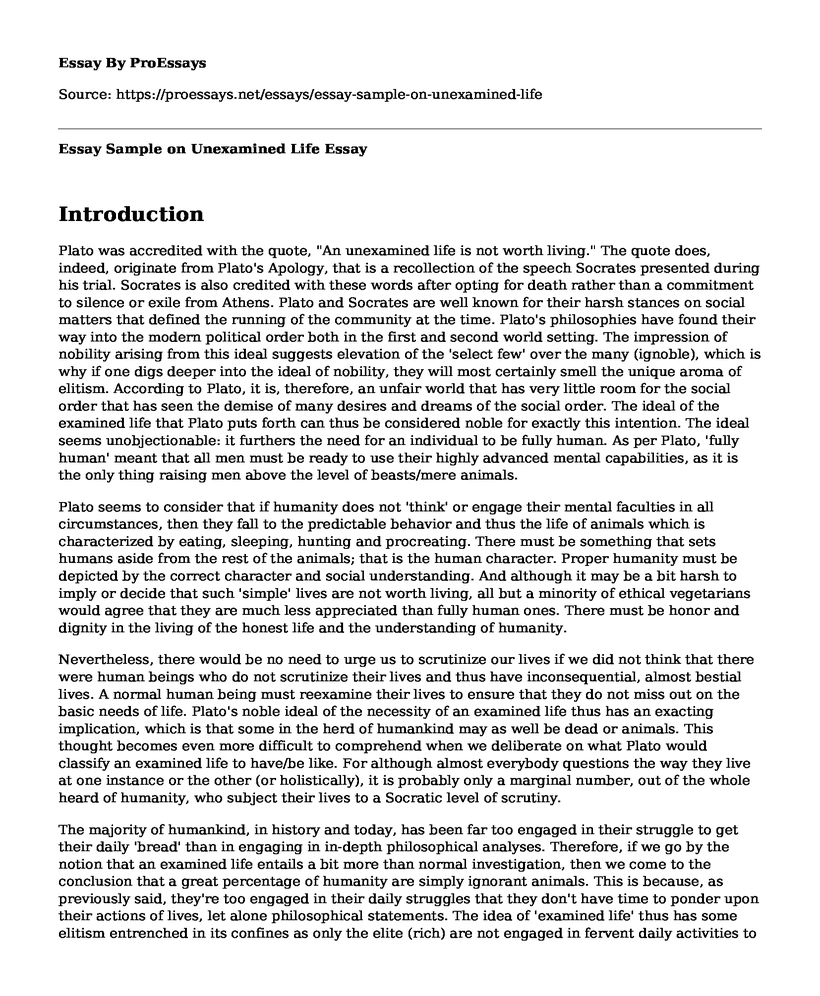Introduction
Plato was accredited with the quote, "An unexamined life is not worth living." The quote does, indeed, originate from Plato's Apology, that is a recollection of the speech Socrates presented during his trial. Socrates is also credited with these words after opting for death rather than a commitment to silence or exile from Athens. Plato and Socrates are well known for their harsh stances on social matters that defined the running of the community at the time. Plato's philosophies have found their way into the modern political order both in the first and second world setting. The impression of nobility arising from this ideal suggests elevation of the 'select few' over the many (ignoble), which is why if one digs deeper into the ideal of nobility, they will most certainly smell the unique aroma of elitism. According to Plato, it is, therefore, an unfair world that has very little room for the social order that has seen the demise of many desires and dreams of the social order. The ideal of the examined life that Plato puts forth can thus be considered noble for exactly this intention. The ideal seems unobjectionable: it furthers the need for an individual to be fully human. As per Plato, 'fully human' meant that all men must be ready to use their highly advanced mental capabilities, as it is the only thing raising men above the level of beasts/mere animals.
Plato seems to consider that if humanity does not 'think' or engage their mental faculties in all circumstances, then they fall to the predictable behavior and thus the life of animals which is characterized by eating, sleeping, hunting and procreating. There must be something that sets humans aside from the rest of the animals; that is the human character. Proper humanity must be depicted by the correct character and social understanding. And although it may be a bit harsh to imply or decide that such 'simple' lives are not worth living, all but a minority of ethical vegetarians would agree that they are much less appreciated than fully human ones. There must be honor and dignity in the living of the honest life and the understanding of humanity.
Nevertheless, there would be no need to urge us to scrutinize our lives if we did not think that there were human beings who do not scrutinize their lives and thus have inconsequential, almost bestial lives. A normal human being must reexamine their lives to ensure that they do not miss out on the basic needs of life. Plato's noble ideal of the necessity of an examined life thus has an exacting implication, which is that some in the herd of humankind may as well be dead or animals. This thought becomes even more difficult to comprehend when we deliberate on what Plato would classify an examined life to have/be like. For although almost everybody questions the way they live at one instance or the other (or holistically), it is probably only a marginal number, out of the whole heard of humanity, who subject their lives to a Socratic level of scrutiny.
The majority of humankind, in history and today, has been far too engaged in their struggle to get their daily 'bread' than in engaging in in-depth philosophical analyses. Therefore, if we go by the notion that an examined life entails a bit more than normal investigation, then we come to the conclusion that a great percentage of humanity are simply ignorant animals. This is because, as previously said, they're too engaged in their daily struggles that they don't have time to ponder upon their actions of lives, let alone philosophical statements. The idea of 'examined life' thus has some elitism entrenched in its confines as only the elite (rich) are not engaged in fervent daily activities to get their daily sustenance. To praise or agree with the idea of an examined life to be worth living can thus be said to invalidate the value of millions of fellow humans' lives.
There is however a dilemma presented by the ideal. If we factor what happened to Socrates when he shared his ideas and thoughts in ancient Athens, then we arrive at the conclusion that unexamined life is worth living. Socrates and other 'first thinkers' were executed, as their ideas were considered radicalized and against the state then. Can't the same effect/actions happen to today's thinkers? It surely can as ideals furthered by new age thinkers oppose the norms of society, thus, they may end up like Socrates, dead or imprisoned, for simply sharing their thoughts and ideas resulting from the 'examination' of both their and society's lived.
Conclusion
The ability to think objectively gives humanity the tools to form and shape its own destiny. Without it, humanity would be directionless. In addition, at an individual level, if people do not learn to think objectively for themselves, then they will be left following the thoughts and directives of others. Thus, ideally, the unexamined life is not worth living.
Cite this page
Essay Sample on Unexamined Life. (2022, Nov 13). Retrieved from https://proessays.net/essays/essay-sample-on-unexamined-life
If you are the original author of this essay and no longer wish to have it published on the ProEssays website, please click below to request its removal:
- Essay Example: America's Frontier Ideologies in Levi's Commercial
- Essay Sample on Human Identity
- Principles of Professional Ethics for the Intelligence Community to Nursing Code of Ethics
- Book Analysis Essay on Socrates' Apology
- Critical Thinking and Creative Problem-Solving: 8 Elements of Thought - Essay Sample
- Forming Personal Integrity: How We Define Ourselves - Essay Sample
- Free Essay Sample on Enlightenment: Man's Emergence From Self-Imposed Nonage







